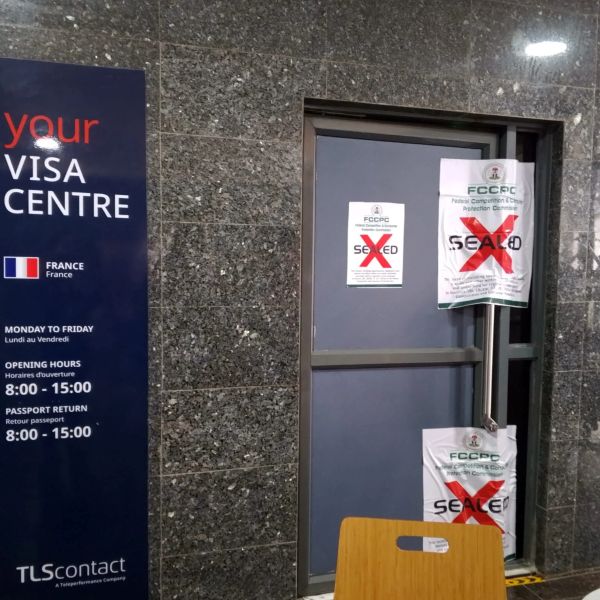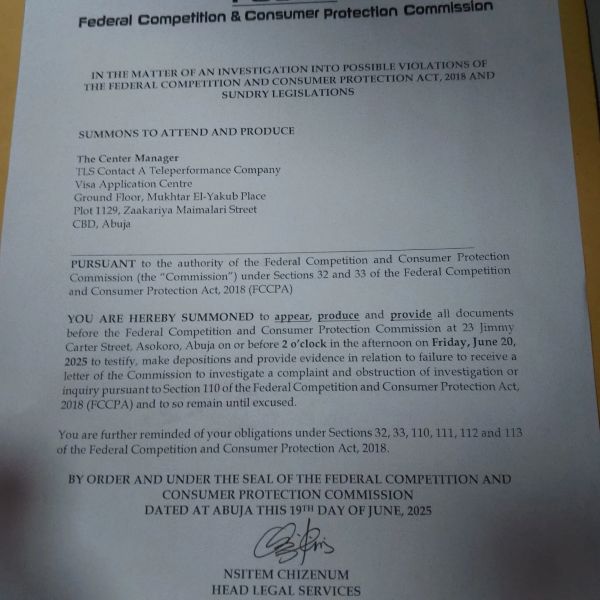FCCPC Shuts Down European Visa Centres in Abuja Over Investigation Obstruction, Suspected Consumer Rights Violations

In an unprecedented clampdown on international service providers operating in Nigeria, the Federal Competition and Consumer Protection Commission (FCCPC) on Thursday sealed visa application centres representing France, Belgium, and Italy over allegations of obstructing investigations and suspected consumer exploitation.
The enforcement action—carried out with the support of operatives from the Nigeria Police Force and the Nigeria Security and Civil Defence Corps—targeted the TLScontact visa facility located at Mukhtar El-Yakub House in Abuja’s Central Business District. TLScontact, a Teleperformance company, manages visa support operations on behalf of several European governments.
A Growing Crackdown on Cross-Border Service Infractions
According to Mrs. Boladale Adeyinka, Director of Surveillance and Investigations at the FCCPC, the Commission’s decision to seal the facility stemmed from repeated refusals by TLScontact staff to receive official communications and cooperate with investigative processes. What began as a simple consumer complaint escalated into a full-blown regulatory standoff involving alleged assault on federal enforcement officers.

“This action is a direct enforcement operation against TLScontact, who provide visa support services to Nigerian consumers,” Adeyinka stated. “On March 25, 2025, a formal letter requesting their cooperation on a consumer complaint was delivered, in line with the FCCPC’s dispute resolution process. Rather than comply, their staff obstructed and assaulted our officers.”
She further disclosed that a follow-up attempt to serve a summons on June 17 was met with renewed hostility, this time allegedly extending to officers of the Nigerian Police accompanying the FCCPC team.
Legal Grounds and Consumer Protection Framework
Section 33 of the Federal Competition and Consumer Protection Act (FCCPA) empowers the Commission to summon any entity for testimony or document production. A refusal to comply, as per the law, constitutes an offence punishable by up to three years in prison or a fine of up to ₦20 million—or both.
“The gravity of TLScontact’s obstruction cannot be overstated,” Adeyinka warned. “They have not only flouted regulatory protocols but endangered the integrity of a process that millions of Nigerians rely upon in good faith.”
She added that the company would be held liable for financial losses or delays suffered by visa applicants due to the sealing of the centre. TLScontact has been summoned to appear before the Commission on June 20 to make formal representations.
The Bigger Picture: International Service Accountability
This development is likely to send ripples through the ecosystem of foreign missions and third-party visa service providers operating in Nigeria. For years, consumer advocacy groups have criticised opaque pricing, poor communication, long delays, and a perceived culture of impunity at some visa centres.
Observers say this enforcement marks a watershed moment in Nigeria’s push to assert its regulatory authority over foreign service franchises operating within its jurisdiction. It also signals a stronger resolve by the FCCPC under the Tinubu administration to enforce consumer rights across sectors—irrespective of diplomatic sensitivities.
Silence from TLScontact
As of press time, the management of TLScontact declined to comment. Efforts to obtain a statement on whether European missions were consulted or informed of the development were unsuccessful. The embassies of France, Belgium, and Italy have also yet to issue formal responses.
Diplomatic and Commercial Implications
While the sealed visa centres are not diplomatic premises per se, their link to sovereign consulates raises the stakes. Experts warn that if mishandled, this standoff could strain bilateral relations or disrupt travel and business engagements between Nigeria and parts of the European Union.
However, business analysts believe that the FCCPC’s move underscores a rising tide of regulatory nationalism aimed at ensuring foreign companies operating in Nigeria adhere to local laws—especially in sectors involving public-facing services or high consumer vulnerability.
As the June 20 FCCPC hearing looms, visa applicants and stakeholders across the travel and international education ecosystem are closely watching what could be a landmark case in Nigeria’s consumer rights enforcement history.












